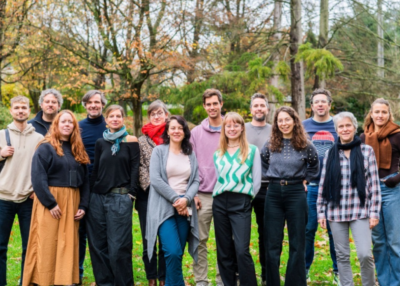
The Brussels audiovisual industry: increased support in the face of the crisis
The past year did not leave the Brussels audiovisual industry unscathed. On Thursday January 21, screen.brussels presented its 2020 results at an online conference revolving around the sector’s future plans. There was talk of considering the evolution of key parameters, namely the broadcast window system, the role of salespeople and international distributors as well as the transition to virtual production.
the support mission of screen.brussels has been decisive in mitigating the effects of the health crisis as much as possible and helping the industry get back on its feet.
Another €1 million invested in projects
In late July, the Brussels-Capital Region government allocated an additional €1 million to screen.brussels fund. The goal was to get productions up and running again, put professionals back to work and generate orders for companies in the industry. An amount of €500,000 was invested in about 20 projects that had already been selected in 2019 and 2020 but were still in production, having been gravely affected by the health crisis. The remaining €500,000 allowed for the selection of more films, documentaries, animated films, series and web series during the September session.
“I am quite proud that more than 100 audiovisual companies have been created or have relocated to Brussels since the creation of screen.brussels in May 2016,” said Rudi Vervoort, Minister-President of the Brussels-Capital Region. “This important sector for the economic, social and cultural development of our Region is also a considerable brand image. I’m thrilled to see Brussels appear on screen more and more often in Belgian productions, French as well as Flemish ones, but also in more and more international co-produtions.”
Specific support
By way of the screen.brussels cluster hosted on hub.brussels, specific support for businesses, entrepreneurs and freelancers was implemented to mitigate the effects of the health crisis, reflect on new business models and generate innovative solutions for resuming activity, content and services.
“Crisis is the mother of opportunity. Faced with the crisis, the audiovisual sector has been able to bounce back and reinvent itself. Many people were able to adapt and have pressed on, despite many obstacles. I am impressed by their creativity and their resilience. Creative and cultural industries are undoubtedly a key sector, which is promising for Brussels and its economy. The cluster of screen.brussels and screen.brussels business will support the city in order to advance and innovate,” explains Barbara Trachte, Secretary of State of the Brussels-Capital Region, responsible for Economic Transition and Scientific Research.
Pascal Smet, Secretary of State of the Brussels-Capital Region, responsible for European and International Relations, and Foreign Trade, reminds us that “screen.brussels brings together all the strength, energy and experience to position the Brussels audiovisual industry on the international stage. It’s why much attention will be paid to relaunching and intensifying foreign actions at fairs and festivals, online or in person when it will be possible to do so again.”
To support the industry, screen.brussels has also actively supported resuming activities by producing more than a thousand masks, starting in April, and by working with Wallimage to co-fund an urgent programme to train nearly 90 covid focal points on film sets.
The screen.brussels business line, which is the dedicated film industry arm of finance&invest.brussels, has also helped 19 companies get regional loans for a total amount of nearly €1.35 million.
More than 1000 days of filming in Brussels, spread out differently
The review in terms of filming is more than encouraging. In 2020, the number of filming days supported by the screen.brussels film commission – 1065 days – is in the upper range compared to the previous 10 years. Due to the health crisis, cameras were a rare sight on the streets of Brussels between March and June, but the 290 projects supported this year bear witness to strong activity. Another consequence of the health crisis: most productions are Belgian, with fiction projects increasingly featuring the Region.
More news on our blog

After Audi: Brussels foreign trade in the first half of 2025
Posted on 28/01/2026
